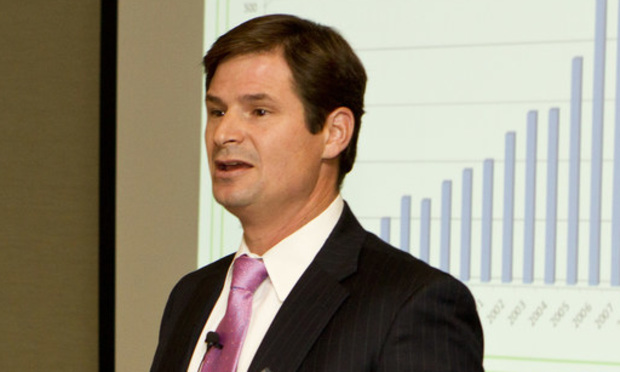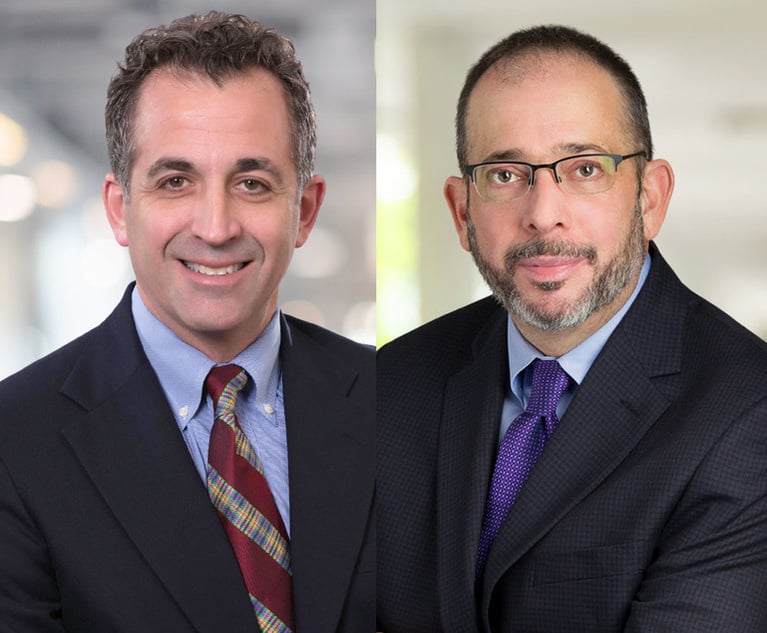Midsized Q&A: Terry Brantley of Swift Currie
"The proper staffing of our firm's administrative management team helps the firm operate at maximum efficiency and allows the attorneys to do what they do best—practice law."
December 29, 2017 at 10:56 AM
6 minute read
 Terry Brantley, Swift Currie McGhee & Hiers (Photo: John Disney/ALM)
Terry Brantley, Swift Currie McGhee & Hiers (Photo: John Disney/ALM)
This interview is the first of what we hope will be a series of conversations with leaders of midsized law firms in the region. These are firms with 50 to 199 lawyers that tackle challenges distinct from those facing boutiques and Big Law.
According to his firm biography, Terry Brantley represents clients in Georgia and South Carolina in a wide variety of tort actions involving both personal injury and property damage. Following graduation from the Walter F. George School of Law at Mercer University in 1997, Brantley began his legal career by representing plaintiffs in lawsuits similar to those he currently defends. In 1999, he joined Swift, Currie, McGhee & Hiers. He became managing partner in January 2016.
How big is your firm, where is it located, and what are its primary areas of practice and focus?
Since July 2016, we have grown from 107 attorneys to 123 at present, an increase of 15 percent in the past 17 months. Swift Currie is the 12th-largest law firm in Atlanta. Our firm is based in Atlanta, but we have a Birmingham office as well. Our primary focus is litigation, primarily in insurance law, product liability law, workers' compensation and commercial law and a number of other areas. We practice in 22 different areas altogether. In addition, we are in the process of adding lateral partners who will strengthen our business and our position in the marketplace.
What do you view as the two biggest opportunities for your firm, and what are the two biggest threats?
Our biggest opportunities result from our ability to attract new clients and legal talent. These opportunities arise from the fact that we handle a substantial amount of litigation throughout the Southeast. We tried more than 100 cases last year and expect the same this year. Furthermore, we have a long-standing reputation of competently and efficiently handling litigation matters throughout the Southeast and nationwide. These facts have enabled us to attract dozens of new clients and to hire 16 new attorneys this year, recruiting the top attorneys in our sector. We expect to continue to capitalize on these opportunities.
As for threats, the ever-changing landscape of the legal industry continues to be challenging. Many firms have opened offices and moved into our market, trying to gain market share. Nonetheless, as referenced earlier, we continue to grow. Another challenge we face is continued pressure to keep legal rates low. Because litigation matters can be unpredictable and, therefore, costs can escalate quickly, we spend a great deal of time trying to identify the most efficient manner in which we can handle our clients' litigation. We also make it a point to honestly communicate the budget with the client and then keep them updated throughout the course of their matters.
After the recession hit, the prevailing theory was that midsized firms would start to see more work come their way from large clients who could no longer justify paying Big Law rates. What has been your experience?
Yes, while this has certainly been true, and we have seen a significant uptick in work since the recession, I think it is in large part due to a combination of factors, including clients who did not want to pay the higher costs of large firms, our focus on quality and positive outcomes and our ability to efficiently handle our clients' matters.
Are your clients pushing for more alternative fee arrangements and, if so, what types? Is your firm amenable to those requests?
Our firm leads conversations with clients about alternative fees. Having said that, we've seen a slight uptick in alternative fee arrangements but it has not been adopted wholesale. If I'm being honest, the theory that alternative fee models would predominate following the recession didn't really play out as much as people thought.
There is much debate around how law firms can foster the next generation of legal talent. What advantages and disadvantages do midsized firms have in attracting and retaining young lawyers, particularly millennials?
Millennials comprise the largest generational group at law firms of our size and will soon be taking over leadership positions. Our advantage as a midsized firm is that less-experienced attorneys work directly with senior-level partners, allowing them to receive excellent training. As a result of this dynamic, Swift Currie is uniquely positioned for success in the coming years. Up and coming lawyers have a voice and want the chance to make a noticeable difference within the firm. In addition, we work hard to create an atmosphere that will attract the top millennial attorneys. For example, during the eclipse in August, we held a party at our building for the firm's employees, and on Halloween, we closed early so that attorneys with young children could spend that quality time. We think these are examples of situations that help our recruiting.
Does your firm employ any nonlawyer professionals in high-level positions (e.g., COO, business development officer, chief strategy officer, etc.)? If so, why is it advantageous to have a nonlawyer in that role? If not, have you considered hiring any?
Yes, we have and rely extensively on our high-level nonlegal professionals. We have directors in various departments, including billing, benefits, business development, finance, human resources, IT and marketing. We understand and encourage bringing in nonlawyer talent and the vital role such individuals play in helping our firm to operate at its finest. As lawyers, we are not trained in areas such as human resources, IT and marketing and, for many of us, these business disciplines do not come naturally. The proper staffing of our firm's administrative management team helps the firm operate at maximum efficiency and allows the attorneys to do what they do best—practice law.
What would you say is the most innovative thing your firm has done recently, whether it be internal operations, how you work with clients, etc.?
Internally, we have retained various outside speakers to help with the professional development of our lawyers. These training sessions have included LinkedIn training and workshops on how to have more meaningful and efficient conversations with clients. The “Client Conversations” workshop was facilitated by Laura Meherg of the Wicker Park Group and was implemented in partnership with our director of business development. In one case, an attorney put to use the principles he learned during one of these seminars and shortly thereafter met with a client from which he received four additional matters after originally expecting to receive one, which this attorney attributed to asking the right questions and getting his client to talk about his challenges and goals.
This content has been archived. It is available through our partners, LexisNexis® and Bloomberg Law.
To view this content, please continue to their sites.
Not a Lexis Subscriber?
Subscribe Now
Not a Bloomberg Law Subscriber?
Subscribe Now
NOT FOR REPRINT
© 2025 ALM Global, LLC, All Rights Reserved. Request academic re-use from www.copyright.com. All other uses, submit a request to [email protected]. For more information visit Asset & Logo Licensing.
You Might Like
View All
Billing Rate Increases Boost Atlanta and Southeast Law Firms' Financial Growth
6 minute read
Bradley Arant Sees Revenues Rise and PEP Fall Amid 12% Equity Partner Expansion
5 minute read
As Associate Pay Raises Divide the Market, Several Law Firms Match, Others Hold Off
5 minute read
Phila.-Based Weber Gallagher Opens Florida Outpost With Fowler White Partner
4 minute readTrending Stories
Who Got The Work
J. Brugh Lower of Gibbons has entered an appearance for industrial equipment supplier Devco Corporation in a pending trademark infringement lawsuit. The suit, accusing the defendant of selling knock-off Graco products, was filed Dec. 18 in New Jersey District Court by Rivkin Radler on behalf of Graco Inc. and Graco Minnesota. The case, assigned to U.S. District Judge Zahid N. Quraishi, is 3:24-cv-11294, Graco Inc. et al v. Devco Corporation.
Who Got The Work
Rebecca Maller-Stein and Kent A. Yalowitz of Arnold & Porter Kaye Scholer have entered their appearances for Hanaco Venture Capital and its executives, Lior Prosor and David Frankel, in a pending securities lawsuit. The action, filed on Dec. 24 in New York Southern District Court by Zell, Aron & Co. on behalf of Goldeneye Advisors, accuses the defendants of negligently and fraudulently managing the plaintiff's $1 million investment. The case, assigned to U.S. District Judge Vernon S. Broderick, is 1:24-cv-09918, Goldeneye Advisors, LLC v. Hanaco Venture Capital, Ltd. et al.
Who Got The Work
Attorneys from A&O Shearman has stepped in as defense counsel for Toronto-Dominion Bank and other defendants in a pending securities class action. The suit, filed Dec. 11 in New York Southern District Court by Bleichmar Fonti & Auld, accuses the defendants of concealing the bank's 'pervasive' deficiencies in regards to its compliance with the Bank Secrecy Act and the quality of its anti-money laundering controls. The case, assigned to U.S. District Judge Arun Subramanian, is 1:24-cv-09445, Gonzalez v. The Toronto-Dominion Bank et al.
Who Got The Work
Crown Castle International, a Pennsylvania company providing shared communications infrastructure, has turned to Luke D. Wolf of Gordon Rees Scully Mansukhani to fend off a pending breach-of-contract lawsuit. The court action, filed Nov. 25 in Michigan Eastern District Court by Hooper Hathaway PC on behalf of The Town Residences LLC, accuses Crown Castle of failing to transfer approximately $30,000 in utility payments from T-Mobile in breach of a roof-top lease and assignment agreement. The case, assigned to U.S. District Judge Susan K. Declercq, is 2:24-cv-13131, The Town Residences LLC v. T-Mobile US, Inc. et al.
Who Got The Work
Wilfred P. Coronato and Daniel M. Schwartz of McCarter & English have stepped in as defense counsel to Electrolux Home Products Inc. in a pending product liability lawsuit. The court action, filed Nov. 26 in New York Eastern District Court by Poulos Lopiccolo PC and Nagel Rice LLP on behalf of David Stern, alleges that the defendant's refrigerators’ drawers and shelving repeatedly break and fall apart within months after purchase. The case, assigned to U.S. District Judge Joan M. Azrack, is 2:24-cv-08204, Stern v. Electrolux Home Products, Inc.
Featured Firms
Law Offices of Gary Martin Hays & Associates, P.C.
(470) 294-1674
Law Offices of Mark E. Salomone
(857) 444-6468
Smith & Hassler
(713) 739-1250






